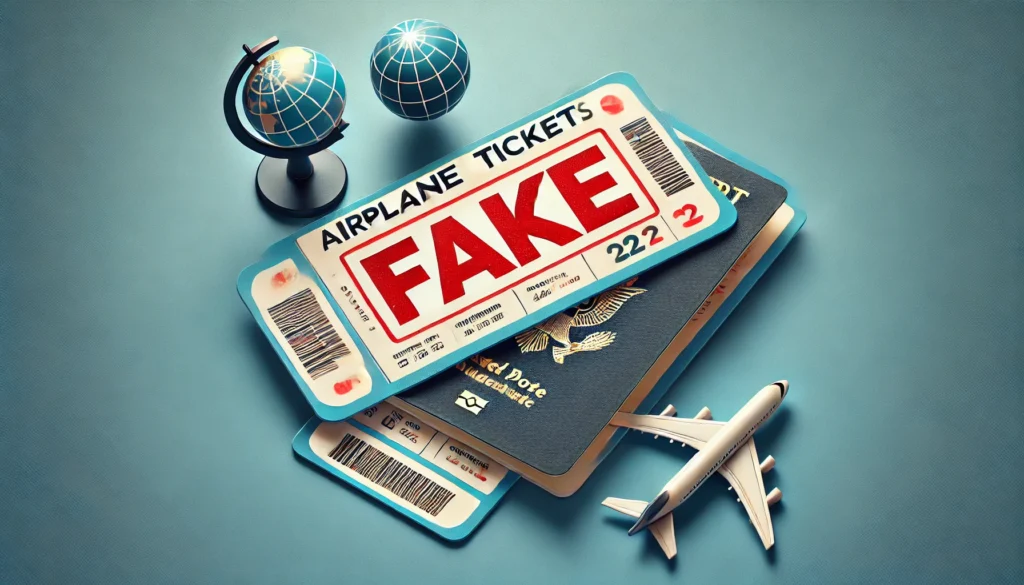The rise of fake ticket scams has become a significant concern for passengers, especially in countries like India where railway travel is a primary mode of transportation. Scammers are leveraging technology to create counterfeit tickets, causing financial losses and inconvenience to unsuspecting travelers. This guide provides insights into the problem and practical steps to avoid falling victim to these schemes.

Image Source : DALL E
Understanding the Growth of Fake Ticket Scams
The proliferation of online transactions has given fraudsters new tools to exploit passengers. These scams often involve:
- Sophisticated Counterfeits: Fake tickets are becoming increasingly difficult to detect as scammers replicate official designs, QR codes, fonts, and even watermarks, creating copies that closely resemble legitimate ones.
- High Demand Periods: During holidays or peak travel seasons, the urgency to secure tickets makes passengers more vulnerable.
- Lack of Awareness: Many travelers are unaware of the methods used to verify a ticket’s authenticity, leaving them susceptible to fraud.
Measures by IRCTC to Combat Ticket Fraud
The Indian Railway Catering and Tourism Corporation (IRCTC) has taken several steps to address the issue of fake tickets. These include:
Advanced E-Ticketing Systems
IRCTC has implemented encrypted technologies in its ticketing system to enhance security and prevent counterfeiting. These technologies work by scrambling data into an unreadable format that can only be decoded with a secure key, ensuring that ticket information remains tamper-proof and authentic.
Collaboration with Law Enforcement
The corporation works closely with law enforcement agencies to identify and prosecute fraudsters, ensuring stricter penalties for those involved.
Regular System Audits
Frequent audits and updates to the ticketing system help close vulnerabilities that scammers might exploit.
Passenger Awareness Campaigns
IRCTC conducts educational campaigns to inform passengers about the risks of fake tickets and the importance of purchasing from authorized sources.
How to Protect Yourself from Ticket Scams

Image Source : DALL E
To safeguard against fraudulent tickets, follow these tips:
1. Purchase from Official Sources
Always buy your tickets through the official IRCTC website or authorized agents. Verified platforms such as MakeMyTrip and Cleartrip also provide legitimate ticket booking services for added convenience. Avoid third-party platforms unless they are verified and reliable.
2. Verify Ticket Details
Check the ticket for discrepancies in the train number, dates, or passenger details. Errors can be a red flag for counterfeiting.
3. Beware of Phishing Attempts
Fraudsters may send fake emails or messages impersonating IRCTC, asking for personal information or payment. To recognize phishing attempts, look for telltale signs such as grammatical errors, suspicious URLs, or unexpected requests for sensitive information. Always verify the sender’s authenticity before responding.
4. Use Secure Payment Methods
Make payments only through trusted channels that offer fraud protection. Avoid cash transactions or untraceable methods.
5. Stay Informed
Keep up-to-date with the latest alerts and announcements from IRCTC about emerging scam techniques and preventive measures.
What to Do If You Encounter a Fake Ticket
If you suspect you’ve been sold a fake ticket, act promptly:
Contact IRCTC
Reach out to IRCTC through their helpline or email, providing all relevant details, such as the ticket number, date of purchase, and payment method.
Report to Law Enforcement
File a report with your local police station or cybercrime unit. For cybercrime in India, you can visit the National Cyber Crime Reporting Portal at cybercrime.gov.in or call their helpline at 1930. Include any evidence, such as receipts or communication with the seller.
Notify Your Bank
If you made the payment online, inform your bank or payment provider to dispute the transaction and potentially recover your funds.
Share Your Experience
Warn others by sharing your story on social media or consumer forums. Your account can help prevent similar incidents.
Conclusion
Fake ticket scams are an unfortunate byproduct of technological advancements, but with vigilance and awareness, passengers can protect themselves. By purchasing tickets through official channels, verifying details, and staying alert to potential frauds, you can enjoy a hassle-free travel experience. Additionally, reporting scams contributes to a safer travel environment for everyone.


